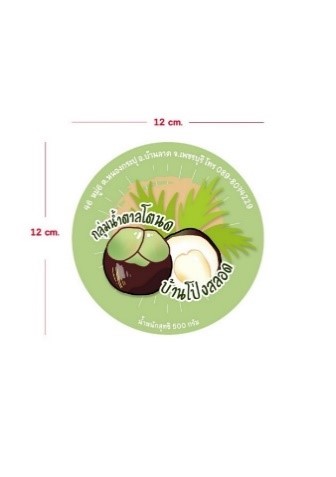Brand Creation of Palm Sugar in Phetchaburi Province of Thailand
Keywords:
Brand Creation, Brand, Palm Sugar, Palm Sugar ProductsAbstract
Today's Palm sugar products have not been rebranded and developed to be accepted by their customers. Therefore, the brand must be developed and designed to add value to the product. The purposes of this research were to study Brand Creation of Palm Sugar in Phetchaburi province, Thailand. Mixed methodology, quantitative and qualitative method, was used in this paper by research questionnaire as a tool for collecting data from the Palm sugar product’s customers, meanwhile setting a focus group for brain storming from the community enterprise groups. Research finding showed that firstly, Palm sugar product firms didn’t improve their brand and make the customer’s brand acceptance or even had not their own brand. Secondly, the crucial factors affecting to brand creation for the customer’s acceptance and demand emphasized on using fit language to communicate with customers, making clearly differentiation to brand quality, keeping customers relationship with brand creation and construction a new characteristic to brand creation consecutively. And finally, the factors affecting to brand acceptance of Palm sugar products were comprised of brand prominence, brand efficacy, brand image, consumer decisions about the brand, consumers feel about the brand and brand engagement.
References
เกรียงกานต์ กาญจนะโภคิน. (2555). แนวคิดของแบรนด์. หนังสือพิมพ์กรุงเทพธุรกิจ. สืบค้น 11 สิงหาคม 2560, จาก https://www.bangkokbiznews.com/blog/detail/456375.
ชุติมา ไวศรายุทธ์และ ชนิกา ศิริมังคลากุล. (2551). ปัจจัยที่มีผลทำให้การสร้างตราสินค้าใน กลุ่มสินค้าเกษตรประสบความสำเร็จ. วารสารมหาวิทยาลัยนเรศวร, 16(1), 33-42.
ณัฐพล จารัตน์. (2555). สร้างแบรนด์ Kit Kat Japan ด้วยการลากเข้าความ. วารสารนักบริหาร, 32(3), 122-126.
นภสมน นิจรันดร์. (2558). ความยั่งยืนของน้ำตาลโตนด กับความมั่นคงทางอาหารด้วยวิถีการผลิตโดยภูมิปัญญาท้องถิ่น. วารสารสถาบันวิชาการป้องกันประเทศ, 58-66.
แน่งน้อย บุญยเนตร. (2562). กลยุทธ์การตั้งชื่อตราสินค้าหนึ่งตำบลหนึ่งผลิตภัณฑ์ระดับ 5 ดาวในประเทศไทย. วารสารนิเทศศาสตร์ปริทัศน์, 3(1), 245–259.
ประสิทธิ์ รัตนมณี. (2553). โดดเดี่ยวบนปลายตาล ลมหายใจของอาชีพขึ้นตาลโตนดที่บ้านภูมีน้ำพุ่ง ปัตตานี. วารสารรูสมิแล, 31(2), 51–56.
ประเสริฐ โพคะ และคณะ. (2554). วิธีการผลิตในกระบวนการเกษตรและการจัดการป่าชุมชนกับการเปลี่ยนแปลงภูมิอากาศและการสร้างความมั่นคงทางอาหารของชุมชนกะเหรี่ยงในภาคเหนือของประเทศไทย. เชียงใหม่: มูลนิธิพัฒนาภาคเหนือ (มพน.) และชุมชนห้วยหินลาด.
รัชภูมิ ทรัพย์ปกรณ์. (2558). ตราสินค้าละความผูกพัน. สืบค้น 20 ตุลาคม 2562, จาก http://marketingmmr.blogspot.com/2015/06/blog-post_75.html.
รัฐวิทย์ ทองภักดี. (2559). 7 กลยุทธ์เด็ดพิชิตธุรกิจ ร้านอาหาร. สืบค้น 13 กันยายน 2559, จาก http://www.smethailandclub.com/knowledgesview.php?id=329.
สุวิมล อังควานิช และนภสมน นิจรันดร์. (2555). การทำน้ำตาลโตนดในอำเภอบ้านลาด จังหวัดเพชรบุรี: การเปลี่ยนแปลงทางสังคมวัฒนธรรม การปรับตัวสู่แนวโน้มการประกอบอาชีพ. วารสารรามคำแหงฉบับมนุษยศาสตร์, 32(1), 256–268.
MGR Online. (2555). อาชีพทำน้ำตาลโตนดรายได้ดี แต่ไร้การสืบทอดจากคนรุ่นใหม่.หนังสือพิมพ์ผู้จัดการ. สืบค้น 15 กรกฎาคม 2560, จาก https://mgronline.com/south/detail/9550000142560.
อานุมาต มะหมัด และ พีรภาว์ ทวีสุข. (2561). ภาพลักษณ์ตราสินค้าที่มีอิทธิพลต่อกระบวนการตัดสินใจซื้อผลิตภัณฑ์อาหารแปรรูปประเภทไส้กรอก ในร้านสะดวกซื้อ A ในกรุงเทพมหานคร. สุทธิปริทัศน์, 32(103), 131–147.
อัคร์วิชญ์ เชื้ออารย์. (2556). ปัจจัยที่มีผลต่อความภักดีในแบรนด์ “Greyhound” ของผู้บริโภคในกรุงเทพมหานคร. วารสารบริหารธุรกิจศรีนครินทรวิโรฒ, 4(2), 74–88.
Aaker, D. A. (1991). Managing Brand Equity: Capitalizing on the Value of a Brand Name. New York: The Free Press.
Aaker, D. A. (1996). Building Strong Brand. New York: Free press.
Chimhundu, R. and Hamlin, R. (2007). Future of the Brand Management Structure in FMCG. The Journal of Brand Management, 14(3), 232-239.
Cochran, W.G. (2013). Sampling Techniques (3rd Edition). New York: John Wiley and Sons Inc.
Cronbach, L.J. (1990). Essentials of Psychological Testing (5th Edition). New York: Harper Collins Publishers Inc.
Deborah, A. S. et al. (2007). Who Goes to the Bargaining Table? The Influence of Gender and Framing on the Initiation of Negotiation. Journal of Personality and Social Psychology, 93(4), 600-613.
Hair, J. F. et al. (2010). Multivariate Data Analysis. 7th Edition. Upper Saddle River, New Jersey: Prentice Hall.
Keller K.L. (2003). Strategic Brand Management, Building, Measuring, and Managing Brand Equity (2nd Edition). New Jersey: Pearson.
Kotler, P. (2000). Marketing management (10th Edition). Upper Saddle River, New Jersey: Prentice.
Wallstrom, A. (2008). Building a corporate brand: The internal brand building process in Swedish service firms. Journal of Brand Management, 16(1-2), 40-50.

Downloads
Published
How to Cite
Issue
Section
License
Copyright (c) 2022 Phayao University

This work is licensed under a Creative Commons Attribution-NonCommercial-NoDerivatives 4.0 International License.
ผู้นิพนธ์ต้องรับผิดชอบข้อความในบทนิพนธ์ของตน มหาวิทยาลัยพะเยาไม่จำเป็นต้องเห็นด้วยกับบทความที่ตีพิมพ์เสมอไป ผู้สนใจสามารถคัดลอก และนำไปใช้ได้ แต่จะต้องขออนุมัติเจ้าของ และได้รับการอนุมัติเป็นลายลักษณ์อักษรก่อน พร้อมกับมีการอ้างอิงและกล่าวคำขอบคุณให้ถูกต้องด้วย
The authors are themselves responsible for their contents. Signed articles may not always reflect the opinion of University of Phayao. The articles can be reproduced and reprinted, provided that permission is given by the authors and acknowledgement must be given.







